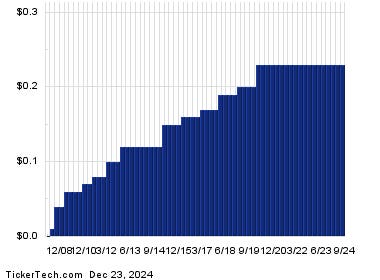On Monday, shares of Western Union were yielding over 9% thanks to an annualized quarterly dividend of $0.94, trading as low as $10.39 per share. Dividends are critical for investors since they contribute significantly to overall market returns. For instance, if an investor had purchased shares of the iShares Russell 3000 ETF (IWV) on May 31, 2000, at a price of $78.27, they would find the value had fallen to $77.79 by May 31, 2012, marking a modest decline of 0.6%. However, the same investor would have received a substantial $10.77 per share in dividends over that twelve-year span, resulting in a robust total return of 13.15%. This scenario illustrates how dividends can transform a stagnant or declining investment into a more lucrative opportunity, particularly when compared to Western Union’s impressive yield.
The historical performance and volatility of dividends are key factors that investors need to assess when considering a stock like Western Union. While dividends can enhance total returns, they are heavily dependent on a company’s profitability, which can fluctuate over time. Investors must delve into the historical dividend distribution of Western Union to ascertain if the current yield is sustainable. Examining the dividend history can provide insights into the company’s financial health and its ability to maintain or increase dividend payouts. Such assessments enable investors to set realistic expectations for future returns based on a company’s established patterns and market conditions.
Looking at Western Union’s position within the Russell 3000 index further emphasizes its standing as one of the largest companies in the U.S. stock market. Being a constituent of this index not only lends credibility but also signifies that Western Union is part of an important benchmark used to gauge the performance of the broader market. Shares that yield above 9% are particularly attractive within this context, especially for income-focused investors, who prioritize high returns from dividends. This makes Western Union a compelling option for those seeking to balance risk with the potential for substantial yield.
Dividend reliability is often tied to a company’s financial stability and profitability metrics. As dividends are typically adjusted in accordance with a company’s earnings, investors should closely monitor financial statements and market performance indicators. Trends in revenue, net income, and cash flow are crucial to understanding whether a company can sustain its dividend payments. For Western Union, analyzing quarterly earnings reports and market trends can provide a clearer picture of its capacity to maintain or grow its dividend in the future. Evaluating these factors contributes to making informed investment decisions in a potentially volatile market.
Furthermore, passive income through dividends can mitigate losses in market downturns, making dividend-paying stocks more appealing during uncertain economic times. Given the current economic climate, with fluctuating stock values, a solid dividend yield can provide a cushion against volatility, ensuring that investors receive consistent payouts. The 9% yield offered by Western Union can serve as a substantial safety net for investors, representing reliable income even when stock prices may struggle. Consequently, those targeting consistent cash flows without relying solely on capital appreciation may find Western Union to be an especially attractive investment vehicle.
In conclusion, Western Union’s positioning in the market, along with its dividend yield of over 9%, presents a compelling opportunity for investors. While dividends play a crucial role in the overall stock market returns, careful consideration of a company’s financial health and dividend history is essential in evaluating the sustainability of such yields. The potential for high returns, combined with the safety that dividends can provide, positions Western Union as an appealing option for income-focused investors. As always, thorough research and due diligence should guide investment decisions, ensuring that investors remain informed and equipped to navigate the complexities of the stock market.

